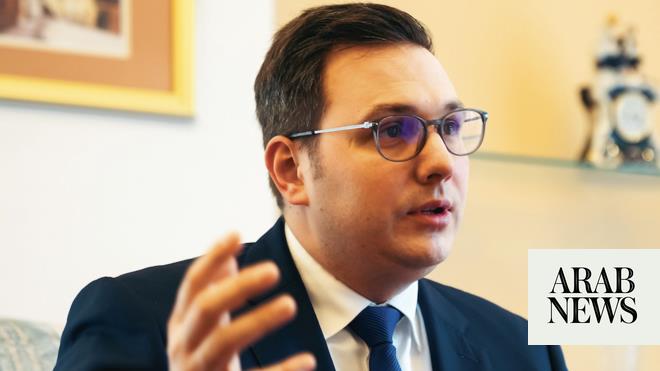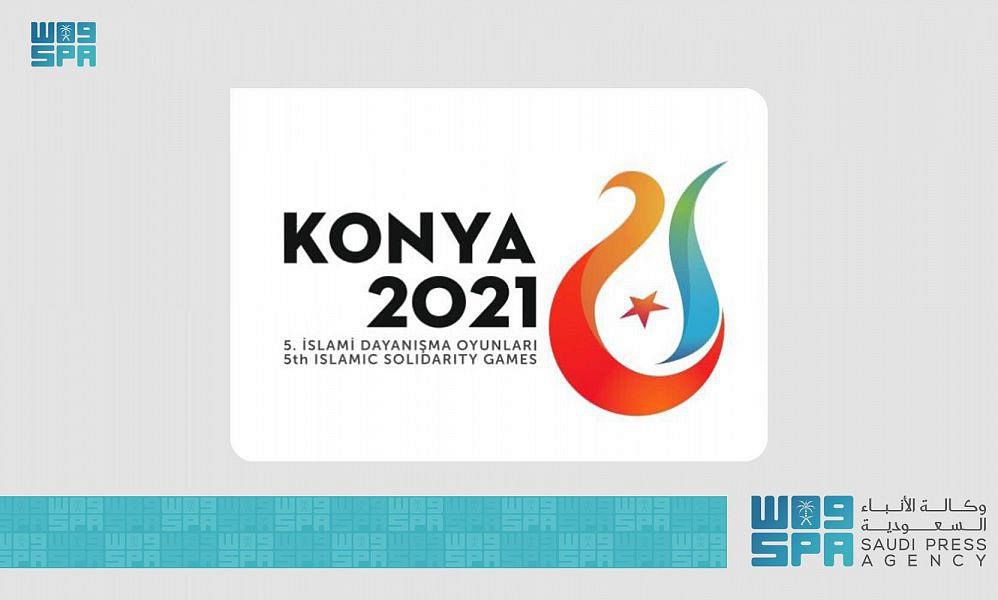
RIYADH: The Czech Republic is keen to take part in the development of various sectors in Saudi Arabia in line with the goals of Vision 2030, according to the country’s chief diplomat.
Speaking to Arab News, Foreign Minister Jan Lipavsky praised the rapid progress being made as part of the Saudi reform strategy, describing the changes as “something you can see with your own eyes,” and expressed an eagerness to facilitate collaboration between the two countries to help the Kingdom reach its goals.
First announced by Crown Prince Mohammed bin Salman in 2016, Vision 2030 is a strategic framework to reduce Saudi Arabia’s dependence on oil, diversify its economy, and develop public service sectors, such as health, education, infrastructure, recreation and tourism.
“Everyone feels the thriving change in Saudi Arabia motivated by Vision 2030. So, definitely, it is something which we want to participate in, in the most positive and mutually beneficial manner,” Lipavsky said.
The interview took place on Wednesday, just hours after Lipavksy met with his Saudi counterpart, Prince Faisal bin Farhan — “a very good meeting, a very productive meeting” — to review aspects of Saudi-Czech relations and areas of bilateral cooperation, including regional and international issues of mutual concern.
According to a Saudi Press Agency report, the two ministers also discussed efforts by Saudi Arabia and Czechia to lay a foundation for international peace and security, as well as contribute to achieving global sustainable development goals.
During an interview with Arab News, Foreign Minister Jan Lipavsky praised the rapid progress being made as part of the Saudi reform strategy. (AN Photo/Abdulrahman Fahad bin Shulhub)
The goal of the visit by Lipavsky, who was accompanied by a 15-member Czech business delegation, was described by his ministry as “deepening of political and economic cooperation in the context of the Saudi Arabia’s efforts to open the country more to the international community or to develop the local economy toward industrial innovation and diversification of state revenues.”
Elaborating on the topic, Lipavsky said: “There are traditional (Czech) industries like tourism and spa, but we can also discuss energy, because the energy industry globally is going to be transformed. There is a lot of interest in renewable resources and we are very much interested, for example, in cooperation in the hydrogen industry.”
Pointing to the EU, of which Czechia has been a member since 2004, he said the bloc is “looking for renewable sources of energy, and also sources of energy which will be carbon neutral.”
He added: “I feel that Saudi Arabia wants to be part of the change, too, which is a very clever decision, and I understand that.”
In 2003, the Czech-Saudi Business Council was created by the Saudi Chamber of Commerce and Industry and the Czech Chamber of Commerce. The council would eventually go on to hold biannual meetings in both countries.
Over the past 22 years, the two countries have signed more than nine agreements and memoranda of understanding covering healthcare, science and technology, commerce and industry, and avoidance of double taxation.
In recent years, several Czech companies, including the well-known Czech vehicle manufacturer Tatra Trucks, have expanded into the Kingdom. More than 2,500 of Saudi Arabia’s medium and heavy military vehicles are Tatra, produced domestically by the Saudi Military Industries Corporation.
Czech-Saudi business ventures are also evident in the healthcare field, which is witnessing growing cooperation between the two countries. The Czech Saudi Medical Company has operated in the Kingdom since 2009, and the Czech Rehabilitation Center in Riyadh offers more than 45 specialized physiotherapy services to more than a thousand patients per day.
According to the UN’s COMTRADE international trade database, Czechia’s exports to Saudi Arabia in 2022 amounted to a little under $600 million, consisting mostly of vehicles, machinery and electrical equipment, while Saudi Arabia’s $11 million in exports were made up mostly of aluminum, plastics and other man-made fibers.
Opening a business event in Riyadh that was attended by the local chamber of commerce, Lipavsky said his country was ready to offer Saudi Arabia high-quality expertise in a number of fields. He told the forum: “Czechia has a long tradition of innovation and we can also be proud of our highly skilled workforce, cutting-edge technologies and quality products. We are always looking for new business opportunities, even in markets outside the single European market.”
Commenting on the meetings with Saudi industry leaders, as well as Czechs working for Saudi companies, Lipavsky told Arab News: “We have quite a lot to offer when it comes to business. There are companies that are traditionally present in the Saudi market, and there are a lot of companies that would like to be part of that.”
Saudi Foreign Minister Prince Faisal bin Farhan receives Czechia’s Foreign Minister Lipavsky. (SPA)
Czech-Saudi relations are more than strictly business, however. In 2017, Jeddah’s honorary consulate hosted the Czech Food Festival, where Saudis sampled beef goulash, roasted duck and potato dumplings prepared by Czech chefs.
The following year, to mark the 100th anniversary of the formation of Czechoslovakia, Riyadh hosted another Czech culinary festival, complete with music played by a traditional Czech band.
Lipavsky explained that Czechia is a tourist destination for many Saudis because of its spa resorts and beautiful landscape, as well as a destination for those from the Kingdom looking to study at the country’s renowned universities.
In September 2021, Lipavsky’s predecessor, Jakub Kulhanek, visited Saudi Arabia , where he met with Prince Faisal and Adel Al-Jubeir, the minister of state for foreign affairs.
Kulhanek said then that Saudi Arabia and Czechia were prepared to establish a “strategic partnership in the near future” and “intensify contacts at the highest political level.”
Referring to that statement, Lipavsky said: “We are working on this goal, and the next step will be another level of consultation between the Czech Ministry of Foreign Affairs and the Saudi Ministry of Foreign Affairs, which will cover many aspects of this relationship.”
After departing from Saudi Arabia, Lipavsky’s delegation visited Iraq, where Czech forces are stationed as part of the US-led coalition to provide military advising and humanitarian aid and participate in NATO missions.
“We have a very strong relationship with Iraq. We want to provide for their security. We have also a military presence in Iraq, but we are also cooperating in many other areas,” he told Arab News.
Czech forces have been in Iraq for more than 30 years, first serving within the Coalition during the Gulf War in 1991 and, later, during the 2003 Iraq war. In 2014, Czechia became a member of the Global Coalition to Defeat Daesh, providing millions of dollars in humanitarian aid, medical care, and civilian training projects.
Czech forces in Iraq have also contributed to police training missions, surgical teams, and chemical protection training teams. After the killing of the Iranian military commander Qassem Soleimani in 2020, Czech forces remained in Iraq even as other countries withdrew their troops due to security concerns.
“Now that there is a new government in Iraq, we need to be in constant dialogue with them and to listen very carefully. What are the needs of Iraq? Of course, it’s not only about the Czech-Iraq relationship, but about the EU-Iraq relationship. And as a member of the EU, we can influence EU policy as well,” Lipavsky said.
Closer to home, Czechia is dealing with its own security and humanitarian concerns since the escalation of the Russia-Ukraine conflict in February 2022.
He said the war “has influenced things, not in a good way, such as the price of energy (and caused) high inflation.
“Then there are also global impacts, for example, on food security, which we can see may lead to crises in, for example, in Africa.”
The minister with Assistant Editor-in-Chief Noor Nugali. (AN Photo/Abdulrahman Fahad bin Shulhub)
He said that Czechia leads the EU in terms of hosting Ukrainian refugees per capita, and added: “My country is under security pressure because of the Russian invasion of Ukraine. We have 10 million people and we have accepted half a million refugees.
“We have opened our hearts and homes. We provided shelter for them. And, you know, we want to have them as a part of society until they are ready to be safe in Ukraine.”
Czechia, a NATO member since 1999, had a significant role in the recent creation of the Register of Damage, a record of damage, losses and injuries caused by the war in Ukraine so far.








